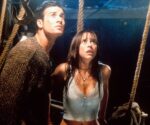Train drivers nearly halted wartime masterpiece now celebrating 80 years | Films | Entertainment
It remains one of the most popular, evocative and enduring films ever made in the UK. Set in and around the fictional Milford Junction, the plot tells the story of two married strangers who meet by chance in a railway station café and fall helplessly in love.
There’s no nudity, no sex scenes and no consummation of the relationship, which somehow only adds to its charm. Instead we get 86 minutes of middle-class English reserve, cut-glass accents and repressed ardour.
The film is, of course, Brief Encounter starring Celia Johnson and Trevor Howard, made during the bitterly cold early weeks of 1945 and released later the same year.
By coincidence, at the same time as Brief Encounter turns 80, so Britain is also marking the 200th anniversary of the modern railway, with the Stockton and Darlington line – the first of its kind in the world – having opened in 1825.
In the history of UK cinema, there aren’t many films that have tapped into the magic and romance often associated with trains – or rather steam trains – as effectively as Brief Encounter. Small wonder the film has been a constant in the TV schedules for decades, this year perhaps more than any other.
“There’s nothing so poignant as a railway journey, especially people saying goodbye to each other at a station in wartime,” Margaret Barton, at 99-years-old the last surviving member of the cast, once said.
“The film still fascinates people today because it evokes the atmosphere of the war so well. There’s a lovely shot as the titles go up of that great express running through and the train making that marvellous noise, with all the steam everywhere.”
Every film has its ups and downs while coming together. The right actors have to be cast, the right locations have to be found, the right script has to be written, and so on. Brief Encounter certainly had more ups and downs than most.
Based on a Noël Coward play called Still Life, set in England’s Home Counties during the late 1930s, the film couldn’t have picked a worse time to go into production. Although the Second World War was in its latter stages, nobody knew that for certain at the time.
Originally, director David Lean wanted to use Watford Junction, around 15 miles from London on the main railway line to north-west England and Glasgow, as the setting for Milford Junction. No siree, said the War Office, concerned about the use of arc lights while filming at night and the danger of air raids.
And so the search began for a suitable station somewhere safer, preferably in the north of England. Lean settled on Carnforth, in the upper reaches of Lancashire, a bustling mecca at the time where passengers changed trains and steam locomotives took on coal and water for their onward journeys.
Carnforth station also had the all-important café where Laura Jesson, played by Johnson, meets idealistic doctor Alec Harvey, played by Howard, who charms her by deftly removing a piece of grit from her eye, so beginning their ultimately doomed tryst.
On location, still not everything went to plan. It was cold, never a good thing in terms of an outdoor shoot. Many of the night shots were ruined when drivers of express trains, spotting bright arc lights in a town where they were expecting total darkness, slowed down to see what was going on. Memos were sent out urging them to speed up which, ultimately, paid off, the dramatic effect of the trains racing through the station making them, to all intents and purposes, co-stars in the movie.
“David Lean chose me personally for my part in Brief Encounter,” recalled Barton, who played café worker Beryl Walters alongside Stanley Holloway (as ticket inspector Albert Godby) and Joyce Carey (playing café owner Myrtle Bagot). “‘That’s the girl I want to play the part of Beryl!’ She was the woman behind the counter in the refreshment room at Carnforth station. Isn’t that lovely? It was my first film. Oh, so romantic!” Released in November 1945 to widespread critical acclaim, Brief Encounter was nonetheless only a moderate success at the box office in the UK.
Although brief encounters had been fairly common amid the social and economic upheaval brought on by the Second World War, the film’s somewhat racy subject matter – even allowing for the couple not consummating their relationship – was seen by some as a step too far, set against the moral climate of the 1940s and the stigma of divorce.
Even Johnson, whose performance won her an Oscar nomination for best actress, had misgivings about accepting the role, being a wife and mother herself, before warming to the task in hand. “There is no getting away from the fact that it is a very good part and one which I should love to play,” she wrote at the time to her husband, Peter Fleming, elder brother of James Bond creator Ian Fleming. “I have found myself already planning how I should play bits and how I should say lines.” However, the so-called “slow-burn” effect ensured the film gradually found its audience at home, having become a major box office hit in the USA, something that has remained constant throughout subsequent generations.
Alas, for many years the same couldn’t be said for Carnforth station. During the 1960s it gradually lost most of its passenger traffic until, by the 1970s, it had become a ghost of its former self, a haunt for drug users and vandals. In 1998, it won the Worst Station Award in a national newspaper poll.
“Tourists come expecting to see a little bit of nostalgia and all they get is a scene out of Mad Max,” declared one of its nominators, adding that it had become “the station from hell”. Since then, it has managed to recapture much of its former glory. In 2003, a heritage centre celebrating the site’s transport and movie history was opened following a fundraising drive by local residents, supported by grants from within the rail industry. The café has also now been restored as the Brief Encounter Refreshment Room Bistro and Bar.
Margaret Barton even made the long journey from her home in Dorset to perform the opening ceremony.
“Although the train station refreshment room interiors where key scenes play out was a set, movie fans still regularly make the pilgrimage to Carnforth railway station in Lancashire where the production was shot early in 1945,” Mark Kermode, the film critic, recalled recently. “Much of the station still looks recognisably unchanged to this day, although real life visitors won’t get to hear Noël Coward’s voice making the station announcements.”
Yes, it’s true – Coward, uncredited in the cast list, provided the film’s station announcements. Eagle-eyed movie buffs might also spot that although set in the Home Counties, there are some unintentional giveaways to the film’s northern set location. Check out some of those destination boards to places such as Keighley, Leeds and Bradford in neighbouring Yorkshire.
But that would be picky. It may not have won any Oscars, but that hasn’t stopped this wartime masterpiece from earning its place in cinema history. In 1999, the British Film Institute placed Brief Encounter second in its list of the top 100 British movies of all time, behind only The Third Man.
In the words of the acclaimed British historian Professor Thomas Dixon, the film “has become a classic example of a very modern and very British phenomenon – weeping over the stiff upper lip, crying at people not crying”.
It may have been filmed in black and white. The vast majority of its cast might no longer be with us. The steam trains that co-starred in many of the scenes have long-since vanished from everyday life, along with those cut-glass accents. The concept of two apparently consenting adults not taking their clothes off may be an alien one to cinema goers in the 21st century. None of that appears to matter when it comes to Brief Encounter.
“Nothing lasts, really,” reflects Celia Johnson’s character at one point in the film. Except, in the case of Brief Encounter, it’s making a pretty good go of it.









